|
Books Should Be Free Loyal Books Free Public Domain Audiobooks & eBook Downloads |
|
|
Books Should Be Free Loyal Books Free Public Domain Audiobooks & eBook Downloads |
|
Humorous Books |
|---|
|
Book type:
Sort by:
View by:
|
By: Max Beerbohm (1872-1956) | |
|---|---|
 Zuleika Dobson
Zuleika Dobson
‘A wickedly funny 1911 satire on undergraduate life in Edwardian Oxford’ in which the entire student body of Oxford university including the young, handsome aristocrat the Duke of Dorset falls hopelessly in love with Zuleika who is visiting her grandfather, the warden of Judas college, and ultimately commit mass suicide at the end of ‘Eights Week’ | |
By: Metta Victoria Fuller Victor (1831-1885) | |
|---|---|
 The Blunders of a Bashful Man
The Blunders of a Bashful Man
| |
 The Bad Boy At Home And His Experiences In Trying To Become An Editor - 1885
The Bad Boy At Home And His Experiences In Trying To Become An Editor - 1885
| |
By: Miguel de Cervantes Saavedra (1547-1616) | |
|---|---|
 The Exemplary Novels of Miguel de Cervantes Saavedra
The Exemplary Novels of Miguel de Cervantes Saavedra
Originally compiled by Cervantes himself in 1613 as a collection of "exemplary" stories, this translated version from 1881 brings these stories to the English reader. Included in the collection are twelve stories selected by Cervantes, including "A Deceitful Marriage," which famously transitions seamlessly and humorously into the "Dialogue Between Scipio and Berganze". | |
By: Montague Glass (1877-1934) | |
|---|---|
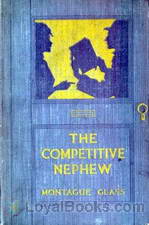 The Competitive Nephew
The Competitive Nephew
| |
By: Nathan Dane Urner (1839-1893) | |
|---|---|
 Never: A Handbook For The Uninitiated And Inexperienced Aspirants To Refined Society's Giddy Heights And Glittering Attainments
Never: A Handbook For The Uninitiated And Inexperienced Aspirants To Refined Society's Giddy Heights And Glittering Attainments
An 1883 tongue-in-cheek spoof of manners and mannerisms of “society”. ‘the “Open Sesame” to that jealously-guarded realm,—good society,—in which you aspire to circulate freely and shine with becoming luster…. And I, the author of this code of warnings, as truly say unto you, that a contemptuous disregard of the same will be likely to lead you into mortification and embarrassment, if not into being incontinently kicked out of doors…. It will be, in truth, a bosom companion in the happiest sense of the term, a mutely eloquent monitor of deportment, a still, small voice as to what is in good form and what is not.’ - Summary by Book Preface and david wales | |
By: Nikolai Vasilievich Gogol | |
|---|---|
 Dead Souls
Dead Souls
Dead Souls by Nikolai Gogol, Russian writer, was first published in 1842, and is one of the most prominent works of 19th-century Russian literature. Gogol himself saw it as an “epic poem in prose”, and within the book as a “novel in verse”. Despite supposedly completing the trilogy’s second part, Gogol destroyed it shortly before his death. Although the novel ends in mid-sentence (like Sterne’s Sentimental Journey), it is usually regarded as complete in the extant form. In Russia before the emancipation of the serfs in 1861, landowners were entitled to own serfs to farm their land... | |
By: Noah Lott | |
|---|---|
 The Silly Syclopedia
The Silly Syclopedia
A Terrible Thing in the Form of a Literary Torpedo which is Launched for HILARIOUS PURPOSES ONLY. Inaccurate in Every Particular Containing Copious Etymological Derivations and Other Useless Things by Noah Lott (an ex-relative of Noah Webster) | |
By: Norman Lindsay (1879-1969) | |
|---|---|
 The Magic Pudding
The Magic Pudding
Bunyip Bluegum the koala sets out on his travels taking only a walking stick. At about lunchtime, feeling more than slightly peckish, he meets Bill Barnacle the sailor and Sam Sawnoff the penguin who are eating a pudding. The pudding is a magic one which, no matter how much you eat it, always reforms into a whole pudding again. He is called Albert, has thin arms and legs and is a bad-tempered, ill-mannered so-and-so into the bargain. His only pleasure is being eaten. The book is divided into four "slices" instead of chapters. (Introduction by Wikipedia) | |
 The Magic Pudding Being the Adventures of Bunyip Bluegum and His Friends Bill Barnacle & Sam Sawnoff
The Magic Pudding Being the Adventures of Bunyip Bluegum and His Friends Bill Barnacle & Sam Sawnoff
| |
By: O. Henry (1862-1910) | |
|---|---|
 Gentle Grafter
Gentle Grafter
If Jefferson "Parleyvoo" Pickens had appeared in print just a few years later, he might have been the "Gentle Grifter" instead of the "Gentle Grafter", the name O. Henry picked for him. His situation as an ethical graft artist gives Jeff an extra impediment in pursuing his craft, but he never wanted it to be too easy. The result is fourteen delightful tales for us and a number of new partners for him. With those partners (he always has at least one) he works his way through a number of confidence games... | |
 O. Henryana
O. Henryana
A book of poems and short stories. - Summary by Fritz | |
By: Oliver Goldsmith (1730-1774) | |
|---|---|
 An Elegy on the Death of a Mad Dog
An Elegy on the Death of a Mad Dog
| |
 An Elegy on the Glory of Her Sex, Mrs. Mary Blaize
An Elegy on the Glory of Her Sex, Mrs. Mary Blaize
| |
By: Oliver Herford (1863-1935) | |
|---|---|
 This Giddy Globe
This Giddy Globe
Is there a genre called FUN? Yes, and this is it! Insanely humorous geography that will have you rolling on the floor laughing with your sides hurting. | |
 The Mythological Zoo
The Mythological Zoo
| |
 The Rubáiyát of a Persian Kitten
The Rubáiyát of a Persian Kitten
| |
 Cupid's Almanac and Guide to Hearticulture for This Year and Next
Cupid's Almanac and Guide to Hearticulture for This Year and Next
| |
By: Oliver Wendell Holmes | |
|---|---|
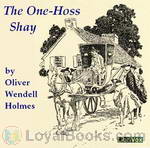 The One-Hoss Shay
The One-Hoss Shay
This is a small collection of whimsical poems by the American physician and author Oliver Wendell Holmes, Sr. "The Deacon's Masterpiece" describes the "logical" outcome of building an object (in this case, a two-wheeled carriage called a shay) that has no weak points. The economic term "one hoss shay," referring to a certain model of depreciation, derives its name from this poem. "How the Old Horse Won the Bet" is a lighthearted look at a horse race. Finally, "The Broomstick Train" is a wonderfully Halloween-y explanation of how an electric tram really works. | |
 Over the Teacups
Over the Teacups
| |
By: Oscar Wilde (1854-1900) | |
|---|---|
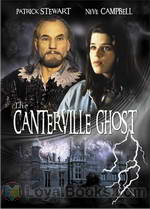 The Canterville Ghost
The Canterville Ghost
An American diplomat's family moves into an ancient stately mansion. They're warned by the owner that it is haunted by a most horrifying and gruesome spirit who had once cruelly murdered his own wife. The story progresses with creaking floor boards, mysterious passages, dark attics, clanking chains, and weird howling. Yet, the reader is totally unprepared for Oscar Wilde's brand of tongue in cheek humor as he takes all the ingredients of a traditional ghost story and turns it on its head, and creates a hilarious parody instead of a morbid saga! The Canterville Ghost was the first of Oscar Wilde's short stories to be published... | |
By: P. G. Wodehouse | |
|---|---|
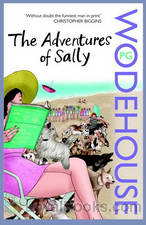 The Adventures of Sally
The Adventures of Sally
Pretty, charming, but impoverished Sally Nicholas' humdrum life is turned upside down when fate decides to step in. In this breezy, romantic comedy, PG Wodehouse delights readers with his portrayal of a charming young American girl who unexpectedly inherits a fortune which changes her life forever. The story follows Sally's fortunes and is told in Wodehouse's typical humorous style and keeps the reader thoroughly entertained to the very end. First published in 1921 as a serial in Collier's Magazine in the US and in 1922 in the Grand Magazine, UK it appeared in book form titled Mostly Sally in 1922... | |
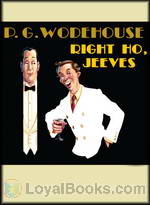 Right Ho, Jeeves
Right Ho, Jeeves
If you're encountering the zany Bertie Wooster and his exceptionally astute Man Friday, Jeeves, for the first time, be assured that you're embarking on a lifetime of fun and laughter! On the other hand, for eternal Wodehouse fans, Right Ho Jeeves provides more glimpses of the delightful world created by one of the best loved English writers. It is the second in the series of Bertie Wooster and Jeeves novels and features some of the regular characters of Brinkley Court, the country seat ruled over by Bertie's much-loved Aunt Dahlia... | |
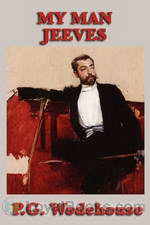 My Man Jeeves
My Man Jeeves
First published in 1919, My Man Jeeves is a collection of short stories featuring the well known fictional characters Jeeves and Bertie Wooster. The compilation consists of eight stories, of which four feature the popular duo while the other four stories feature Reggie Pepper, an early model of Bertie Wooster. Set in the early 20th century, the stories carry much humor, wit, and charming mischief as the characters seem to attract trouble wherever they go. Wodehouse sets the stories in the early 20th century and allows the audience to enter the world of the upper-class establishments, and experience the many awkward situations the characters find themselves in... | |
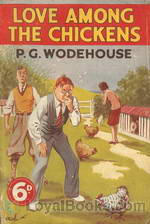 Love Among the Chickens
Love Among the Chickens
A young, but not too brilliant writer is conscripted by a ne'er-do-well friend to help out on a chicken farm in remote Dorset. While traveling to the country, the writer encounters a lovely young girl and her academician father on the train. He is delighted to discover that she is reading a copy of his latest book. In the countryside, he also discovers that the professor and his daughter are neighbors. However, over dinner one night, he gets into an acrimonious debate with the elderly scholar who storms out, furious with his daughter's potential suitor... | |
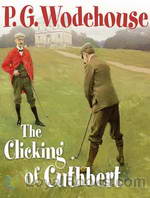 The Clicking of Cuthbert
The Clicking of Cuthbert
The first of two books that he wrote on golfing themes, The Clicking of Cuthbert by PG Wodehouse sparkles with typical Wodehousian wit, humor and general goofiness! An avid golfer himself, Wodehouse published the ten stories in this volume in 1922. In 1924, an American edition titled Golf Without Tears was published. Since then it has enjoyed undimmed popularity among both Wodehouse fans and golfing enthusiasts. Nine of the stories contained in this book are narrated by the Oldest Member, a character who has become a cult figure among Wodehouse fans... | |
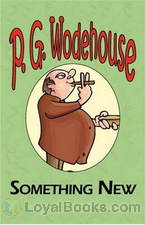 Something New
Something New
When the absent-minded Earl of Emsworth wanders off with the pride of his scarab collection, American millionaire J. Preston Peters is willing to pay $5000 to the person who can get it back for him. Discretion is necessary since Peters’ daughter is engaged to Emsworth’s son. Joan Valentine and Ashe Marson both decide to go after the reward—she as Aline Peter’s ladies maid, and he as Mr. Peter’s valet—and they all end up at Blandings Castle. But is it possible for anyone to steal back the scarab with The Efficient Baxter ever vigilant? This is, IMHO, one of Wodehouse’s funniest novels. –Debra Lynn | |
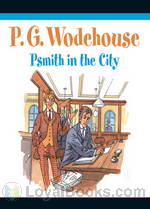 Psmith in the City
Psmith in the City
Mike’s dream of studying and playing cricket at Cambridge are thwarted as his father runs into financial difficulties. Instead, Mike takes on the job of clerk at the “New Asiatic Bank.” Luckily, school friend Psmith, with his boundless optimism and original views, soon joins his department, and together they endeavour to make the best of their new life in London. | |
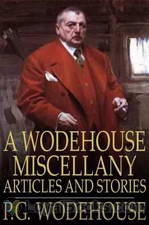 A Wodehouse Miscellany; Articles and Stories
A Wodehouse Miscellany; Articles and Stories
Sir Pelham Grenville Wodehouse was an English comic writer who enjoyed enormous popular success for more than seventy years. Best known today for the Jeeves and Blanding Castle novels and short stories, Wodehouse was also a talented playwright and lyricist who was part author and writer of fifteen plays and of 250 lyrics for some thirty musical comedies. | |
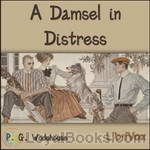 A Damsel in Distress
A Damsel in Distress
A Damsel in Distress is a novel by P. G. Wodehouse, first published in the U.S. on October 4, 1919 by George H. Doran, New York, and in the U.K. by Herbert Jenkins, London, on October 17 1919. It had previously been serialised in The Saturday Evening Post, between May and June that year.Golf-loving American composer George Bevan falls in love with a mysterious young lady who takes refuge in his taxicab one day; when he tracks her down to a romantic rural manor, mistaken identity leads to all manner of brouhaha. | |
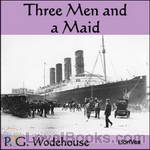 Three Men and a Maid
Three Men and a Maid
This book with two titles, Three Men and a Maid in the USA and The Girl on the Boat in the UK is a typical P.G. Wodehouse romantic comedy, involving, at various times: a disastrous talent quest, a lawyer with a revolver, a bulldog with a mind of his own and a suit of armour! The maid, or marriageable young woman, of the American title is red-haired, dog-loving Wilhelmina “Billie” Bennet. The three men are Bream Mortimer, a long-time friend and admirer of Billie, Eustace Hignett, a poet of sensitive disposition who is engaged to Billie at the opening of the tale, and Sam Marlowe, Eustace’s would-be-dashing cousin, who falls for Billie at first sight... | |
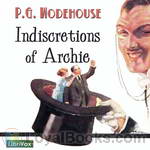 Indiscretions of Archie
Indiscretions of Archie
It wasn’t Archie’s fault really. It’s true he went to America and fell in love with Lucille, the daughter of a millionaire hotel proprietor and if he did marry her–well, what else was there to do?From his point of view, the whole thing was a thoroughly good egg; but Mr. Brewster, his father-in-law, thought differently, Archie had neither money nor occupation, which was distasteful in the eyes of the industrious Mr. Brewster; but the real bar was the fact that he had once adversely criticised one of his hotels... | |
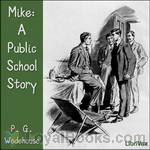 Mike: A Public School Story
Mike: A Public School Story
This novel introduces the characters Mike Jackson and Psmith, who are featured in several of Wodehouse’s later works. It shows how the two characters first met each other as teenagers at boarding school. As Psmith doesn’t appear until about halfway through this book, it was later released as two separate books, Mike at Wrykyn and Mike and Psmith. There’s lots of cricket, but you don’t need to understand the game to enjoy the antics of these public school boys as they "rag" each other and the authorities. | |
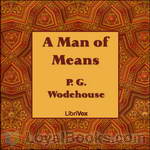 A Man of Means
A Man of Means
A Man of Means is a collection of six short stories written in collaboration by P. G. Wodehouse and C. H. Bovill. The stories all star Roland Bleke, a nondescript young man to whom financial success comes through a series of “lucky” chances, the first from a win in a sweepstake he had forgotten entering. Roland, like many a timid young man seeks love and marriage. In this pursuit his wealth is regularly a mixed blessing. The plot of each story follows its predecessor, sometimes directly, and occasionally refer back to past events in Bleke’s meteoric career... | |
 Selected Short Stories
Selected Short Stories
"A miscellaneous collection of short stories, not featuring any of Wodehouse's regular characters, most concern love and romance and, being Wodehouse, all are amusing." | |
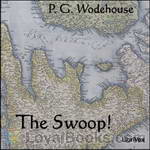 The Swoop!
The Swoop!
The Swoop! tells of the simultaneous invasion of England by several armies — “England was not merely beneath the heel of the invader. It was beneath the heels of nine invaders. There was barely standing-room.” (ch. 1) — and features references to many well-known figures of the day, among them the politician Herbert Gladstone, novelist Edgar Wallace, actor-managers Seymour Hicks and George Edwardes, and boxer Bob Fitzsimmons. | |
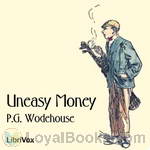 Uneasy Money
Uneasy Money
Uneasy Money is a romantic comedy by P.G. Wodehouse, published during the First World War, it offers light escapism. More romantic but only a little less humorous that his mature works, it tells of the vicissitudes of poor Lord Dawlish, who inherits five million dollars, but becomes a serially disappointed groom. When the story opens Bill (Lord Dawlish, a thoroughly pleasant man) is engaged to a demanding actress. His first thought when hearing of his massive legacy from a stranger whose tendency to slice he once cured on a West Country golf course is of the disappointed relatives... | |
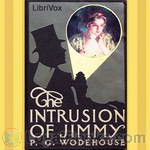 The Intrusion of Jimmy
The Intrusion of Jimmy
The action begins with playboy bachelor Jimmy Pitt in New York; having fallen in love on a transatlantic liner, he befriends a small-time burglar and breaks into a police captain's house as a result of a bet. The cast of characters head to England, and from there on it is a typically Wodehousian romantic farce, set at the stately Dreever Castle, overflowing with imposters, detectives, crooks, scheming lovers and conniving aunts. | |
 The Man With Two Left Feet, and Other Stories
The Man With Two Left Feet, and Other Stories
The Man With Two Left Feet, and Other Stories is a collection of short stories by P. G. Wodehouse, first published in the United Kingdom on March 8, 1917 by Methuen & Co., London, and in the United States in 1933 by A.L. Burt and Co., New York. All the stories had previously appeared in periodicals, usually the Strand in the UK and the Red Book magazine or the Saturday Evening Post in the US. It is a fairly miscellaneous collection — most of the stories concern relationships, sports and household... | |
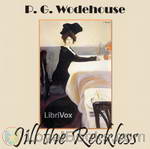 Jill the Reckless
Jill the Reckless
Jill had money, Jill was engaged to be married to Sir Derek Underhill. Suddenly Jill becomes penniless, and she is no longer engaged. With a smile, in which there is just a tinge of recklessness, she refuses to be beaten and turns to face the world. Instead she goes to New York and becomes a member of the chorus of "The Rose of America," and Mr. Wodehouse is enabled to lift the curtain of the musical comedy world. There is laughter and drama in _Jill the Reckless_, and the action never flags from the moment that Freddie Rooke confesses that he has had a hectic night, down to the point where Wally says briefly "Let 'em," which is page 313... | |
 Not George Washington
Not George Washington
It has been said that behind every successful man is a good woman. This is certainly true in the case of James Orlebar Cloyster. However, some funny things happened on his road to success. His story is humorously told from the point of view of several parties involved.According to Wikipedia, the book is a humorous, fictionalized account of Wodehouse's early years as a journalist, with Wodehouse being portrayed by the character of Cloyster. | |
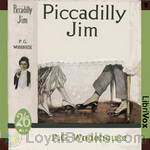 Piccadilly Jim
Piccadilly Jim
A young red-head plots to kidnap her irritating cousin with the help of a former boxer, her uncle, and a rogue who has his eye on her. Things don't work out exactly as planned, as criminals, detectives and cases of mistaken identity all get in the way. | |
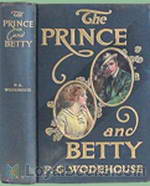 The Prince and Betty
The Prince and Betty
The Prince and Betty is a novel by P. G. Wodehouse. It was originally published in Ainslee's Magazine in the United States in January 1912, and, in a slightly different form, as a serial in Strand Magazine in the United Kingdom between February and April 1912, before being published in book form, in the UK only, by Mills & Boon, London, on 1 May that year. A substantially different version, which incorporated the plot of Psmith, Journalist, was published in the US by W. J. Watt, New York on 14 February 1912, and is the only version now widely available... | |
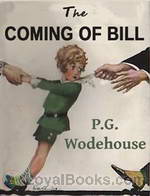 The Coming of Bill
The Coming of Bill
The Coming of Bill tells the story of Kirk Winfield, his marriage to Ruth, and their child called Bill. Bill's upbringing is threatened by the interference of Ruth's busybody writer aunt, Mrs Lora Delane Porter. | |
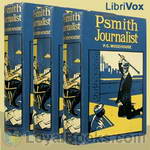 Psmith, Journalist
Psmith, Journalist
Psmith takes over editing a paper while the usual editor is away on vacation. He takes on a local slum lord, and divers alarums ensue. (description by Psuke Bariah) | |
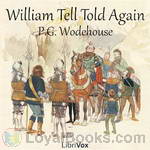 William Tell Told Again
William Tell Told Again
This is the classic story of William Tell - Swiss patriot and great apple-shooter - as seen through the eyes of English humorist P.G. Wodehouse. No Swiss were (permanently) injured in the telling of this story; however, results differed for Austrian tyrants. The original volume also included a humorous poem encapsulating the whole Tell legend, written by John W. Houghton to accompany the sixteen color illustrations. For this audiobook, the stanzas have been collected and read as a single poem. (Introduction by Mark F. Smith) | |
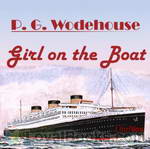 The Girl on the Boat
The Girl on the Boat
Also published as "Three Men and a Maid". The maid of the title is red-haired, dog-loving Wilhelmina "Billie" Bennet, and the three men are Bream Mortimer, a long-time friend and admirer of Billie, Eustace Hignett, a lily-livered poet who is engaged to Billie at the opening of the tale, and Sam Marlowe, Eustace's dashing cousin, who falls for Billie at first sight. All four find themselves on an ocean liner headed for England together, along with a capable young woman called Jane Hubbard who is smitten with Eustace, and typically Wodehousian romantic shenanigans ensue. (Introduction by wikipedia) | |
 Mike and Psmith
Mike and Psmith
| |
 Death at the Excelsior And Other Stories
Death at the Excelsior And Other Stories
| |
 The Gold Bat
The Gold Bat
| |
 The Gem Collector
The Gem Collector
| |
 The Little Warrior
The Little Warrior
| |
 Love Among the Chickens A Story of the Haps and Mishaps on an English Chicken Farm
Love Among the Chickens A Story of the Haps and Mishaps on an English Chicken Farm
| |
 Little Nugget
Little Nugget
Mrs Nesta Ford, in her London hotel room, reveals to her new friend Lord Mountry that she hopes to take her son Ogden on a yachting trip proposed by Mountry, despite her ex-husband having won custody of the boy. As Mountry leaves, Cynthia Drassilis arrives with Ogden, whom she has led away from his father's country house. Mrs Ford rewards Cynthia, but soon Mr Ford's secretary, a Mr Minnick, arrives to recover the stolen child. Cynthia tries to bribe his colleague, Mrs Sheridan, but to no avail, as she believes Nesta's influence has spoiled the boy... | |
 Inimitable Jeeves
Inimitable Jeeves
When either Bertie Wooster or his friends found themselves in the soup or in dangerous proximity to the tureen, the instinct of one and all was to turn to Jeeves - Bertie's Man. He understood human nature, especially that of gilded youth. It did not matter if the hope of an ancient house had fallen in love with a waitress, or if Bertie's cousins Claude and Eustace had been playing dido; Jeeves never failed. His was a sound brain. The only thing in which Jeeves failed, that is in his master's eyes, was that he could not always go the whole way with him in the matter of spats, socks and ties, particularly in the Spring - Jeeves was a purist... | |
 Ukridge
Ukridge
“Do not count your chickens before they are hatched” is a classic saying that might well have been remembered by Ukridge. Ukridge is always on the verge of making a fortune and counting his thousands before they are made. But Dame Fortune is a fickle jade. She eludes him in his great scheme about the dog college, wherein he was to turn out a world supply of trained dogs, and likewise in his backing of Battling Billson, the tender-hearted pugilist. But hope and George Tupper keep Ukridge going. He is ever ready for the next assault. First published as short stories. - Summary by From the introduction | |
 Gentleman of Leisure
Gentleman of Leisure
A wealthy, love-sick bachelor, crooks, and card-sharps ensconced in an English castle make for a classic Wodehousian comedy of star-crossed lovers, imposters and stolen jewels. It all gets a bit thick, what? - Summary by Mark Nelson | |
By: P. Hampson | |
|---|---|
 The Romance of Mathematics Being the Original Researches of a Lady Professor of GirthamCollege in Polemical Science
The Romance of Mathematics Being the Original Researches of a Lady Professor of GirthamCollege in Polemical Science
| |
By: P. T. Barnum (1810-1891) | |
|---|---|
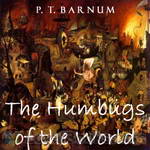 The Humbugs of the World
The Humbugs of the World
P. T. Barnum exposes some of the chief humbugs of the world with his usual entertaining style. He looks at medicine and quacks, ghosts, witchcraft, religious humbugs, money manias, adventurers, personal reminiscences, and much more. | |
By: Palmer Cox (1840-1924) | |
|---|---|
 Frontier Humor in Verse, Prose and Picture
Frontier Humor in Verse, Prose and Picture
Also known for his "Brownies" books, Canadian humorist Palmer Cox give us a delightful collection of humorous verse and short prose vignettes. From the publisher's preface, "thrice happy is the man who, having seen, can tell the fun; and having told, can picture it for others’ eyes and so roll on the rollicking humor, for the brightening of a world already far too sad." - Summary by Larry Wilson | |
By: Percival Leigh (1813-1889) | |
|---|---|
 The Comic Latin Grammar A new and facetious introduction to the Latin tongue
The Comic Latin Grammar A new and facetious introduction to the Latin tongue
| |
By: Percy Hetherington Fitzgerald (1834-1925) | |
|---|---|
 Bardell v. Pickwick
Bardell v. Pickwick
| |
By: Peter Newell (1862-1924) | |
|---|---|
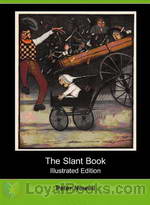 The Slant Book
The Slant Book
The Slant Book is literally the shape of a parallelogram, with the spine of the book running down one side. When opened, facing pages form a “V” shape. All the pictures on the slanted recto pages show a way-too-precocious infant in a carriage [the "go-cart" of yesteryear] racing downhill who has somehow gotten away from his nanny, gleefully creating havoc all along the way! The facing verso pages contain two stanzas of commentary on the charming –if alarming!– illustrations. This book pioneered the “special format” children’s literature of today, such as pop-up books or cutout books like Eric Carle’s The Very Hungry Caterpillar... | |
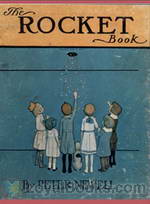 The Rocket Book
The Rocket Book
The Rocket Book begins when the son of a building superintendent sets a match to a rocket he discovered in the basement. Suddenly, the rocket blasts its way up through apartment after apartment in a high-rise, disrupting and transforming the humdrum goings-on of twenty families till it is finally stopped cold by something in the attic. An elliptical hole is punched in each of the book’s pages and illustrations to signify where the rocket passed through every apartment! As in all of Newell’s books, the verse on the verso-page provides commentary on the recto-page illustration... | |
By: Q. K. Philander Doesticks (1832-1875) | |
|---|---|
 The Witches of New York
The Witches of New York
A humorous account of visits to various fortune tellers, card readers, seers, and other "witches" of New York. Written by Q.K. Philander Doesticks (a.k.a.Mortimer Thomson). | |
By: R. D. (Robert Dalziel) Cumming (1871-1958) | |
|---|---|
 Skookum Chuck Fables Bits of History, Through the Microscope
Skookum Chuck Fables Bits of History, Through the Microscope
| |
By: Ralph Keeler (1840-1873) | |
|---|---|
 Vagabond Adventures
Vagabond Adventures
Ralph Keeler failed as a novelist, but this autobiography reflects a life well-lived with humor and adventure. Keeler was in the same literary circle as satirist Bret Harte, novelist Charles Warren Stoddard, editor Thomas Bailey Aldrich, and essayist William Dean Howells. He so impressed Mark Twain that Twain wrote an essay about him called "Ralph Keeler". In 1873, on his way to Cuba, he reportedly was thrown overboard by a Spanish loyalist who objected to his backing of the revolutionary, anti-Spanish movement. - Summary by John Greenman | |
By: Rex Ellingwood Beach (1877-1949) | |
|---|---|
 Going Some
Going Some
| |
By: Richard Barnum | |
|---|---|
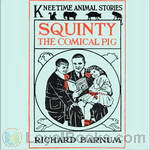 Squinty the Comical Pig
Squinty the Comical Pig
"This comical children's tale about the funny adventures of a funny pig written by an unknown author. The publisher has hired authors to write children's tales, and gave them "house names". The "name" of the author who wrote this tale is Richard Barnum. It became very successful, the most well known of Richard Barnum's tales. So, if you want to laugh a little, even if you are not a child, read this book". | |
By: Richard Brinsley Sheridan (1751-1816) | |
|---|---|
 School For Scandal
School For Scandal
Richard Brinsley Sheridan's comedy was first performed in 1777 and focuses on the intrigues and scandals of the British upper classes. Lady Sneerwell wants to marry Charles Surface, while Joseph Surface wants to marry Maria, an heiress and ward of Sir Peter Teazle. Maria, however, prefers Charles over Joseph. In order to detach her from Charles, Lady Sneerwell and Joseph spread rumors about an affair between Charles and Lady Teazle, Sir Peter's new young wife. Meanwhile, Sir Oliver Surface, newly returned from the East Indies, assumes various disguises to test his nephews' characters. Misunderstandings, mistaken identities, gossip, and bad behavior abound in this uproarious comedy. | |
By: Richard D. Blackmore (1654?-1729) | |
|---|---|
 Essay upon Wit
Essay upon Wit
| |
By: Richard Doyle (1824-1883) | |
|---|---|
 The Foreign Tour of Messrs. Brown, Jones and Robinson Being the History of What They Saw, and Did, in Belgium, Germany, Switzerland & Italy.
The Foreign Tour of Messrs. Brown, Jones and Robinson Being the History of What They Saw, and Did, in Belgium, Germany, Switzerland & Italy.
| |
By: Richard Harding Davis (1864-1916) | |
|---|---|
 The Make-Believe Man
The Make-Believe Man
Adventure was what our protagonist was looking for, when he boarded the steamer "Patience" for his holiday, and when one has a man with such a vivid imagination like Joseph Forbes Kinney as a travel companion, who seems to find adventures at every turn of the road (and if not, he manufactures them), the two travellers are sure to stumble into trouble... | |
 The Princess Aline
The Princess Aline
Morton Carlton, an easy-going, rich young artist, has never taken the concepts of love and marriage all that seriously -- until by accident a copy of an English illustrated paper falls into his hands, which contains a photograph of the young Princess Aline of Hohenwald. Instantly, Carlton is captivated by the princess, and decides that he must meet her. But how to get close to a princess, who lives in a small German duchy well protected by guards and etiquette? Carlton decides to travel to Europe and try his luck... | |
 My Buried Treasure
My Buried Treasure
"This is a true story of a search for buried treasure. The only part that is not true is the name of the man with whom I searched for the treasure. Unless I keep his name out of it he will not let me write the story, and, as it was his expedition and as my share of the treasure is only what I can make by writing the story, I must write as he dictates. I think the story should be told, because our experience was unique, and might be of benefit to others. And, besides, I need the money." (From the text) | |
By: Richmal Crompton (1890-1969) | |
|---|---|
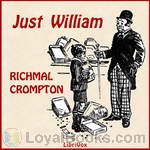 Just William
Just William
William is a mischievous eleven year old who is puzzled by the adult world, which is no less puzzled by him. The humor is gentle and pleasing. The series of books is better known in the United Kingdom than in the U.S. ( | |
 Still - William
Still - William
More humorous adventures by the world’s most misunderstood English boy. - Summary by david wales | |
 William -- The Fourth
William -- The Fourth
The world’s most confident, most chaos-creating eleven year old boy is at it again in these fourteen glorious and funny 1924 short stories. - Summary by David Wales | |
By: Ring Lardner (1885-1933) | |
|---|---|
 Treat 'em Rough Letters from Jack the Kaiser Killer
Treat 'em Rough Letters from Jack the Kaiser Killer
| |
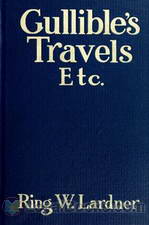 Gullible's Travels, Etc.
Gullible's Travels, Etc.
Humorous stories of social climbing in America's "classless" society. | |
By: Robert Barr (1850-1912) | |
|---|---|
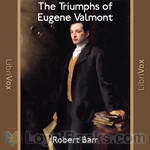 The Triumphs of Eugene Valmont
The Triumphs of Eugene Valmont
Short stories by a colleague of Jerome K. Jerome, and friend of Sir Arthur Conan Doyle. Barr probably wrote the first parody of Sherlock Holmes (included in this collection). He co-edited “The Idler” with Jerome. [written by Czechchris] | |
 In a Steamer Chair and Other Stories
In a Steamer Chair and Other Stories
Thirteen short stories by one of the most famous writers in his day. Robert Barr was a British Canadian short story writer and novelist, born in Glasgow, Scotland. In London of the 1890s Barr became a more prolific author - publishing a book a year - and was familiar with many of the best selling authors of his day, including Bret Harte and Stephen Crane. Most of his literary output was of the crime genre, then quite in vogue. When Arthur Conan Doyle's Sherlock Holmes stories were becoming well known,... | |
By: Robert Benchley (1889-1945) | |
|---|---|
 Love Conquers All
Love Conquers All
Sixty-three essays on a variety of topics as wide apart as Family Life in America, Opera Synopses, Bigamy, International Finance and many more, Love Conquers All by Robert Benchley strangely enough does not touch upon romance at all! However, these delightful notes provide hours of browsing pleasure for young and old readers alike. Robert Benchley was a well-known humorist and newspaper columnist, radio and television presenter, actor, scriptwriter and broadcaster. He is also credited with creating the first ever television entertainment show and one of his iconic short films, How to Sleep won an Academy Award in 1936... | |
By: Robert Fitzgerald | |
|---|---|
 The Statesmen Snowbound
The Statesmen Snowbound
| |
By: Robert Louis Stevenson | |
|---|---|
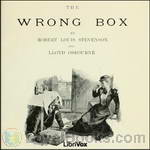 The Wrong Box
The Wrong Box
The Wrong Box is a comedy about the ending of a tontine (a tontine is an arrangement whereby a number of young people subscribe to a fund which is then closed and invested until all but one of the subscribers have died. That last subscriber then receives the whole of the proceeds). The story involves the last two such survivors and their relations, a train crash, missing uncles, surplus dead bodies and innocent bystanders. A farce really. | |
By: Robert Williams Wood (1868-1955) | |
|---|---|
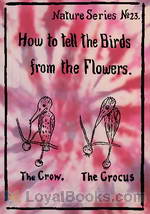 How to Tell the Birds from the Flowers
How to Tell the Birds from the Flowers
How do you tell apart a parrot from a carrot? A plover from a clover? A bay from a jay? Although there are several ways of differentiating, R. W. Wood’s use of pun and rhyme is one of the most entertaining! | |
By: Roger Kuykendall | |
|---|---|
 We Didn't Do Anything Wrong, Hardly
We Didn't Do Anything Wrong, Hardly
| |
By: Rossiter Johnson (1840-1931) | |
|---|---|
 Stories of Comedy
Stories of Comedy
| |
By: Rudolf Erich Raspe (1737-1794) | |
|---|---|
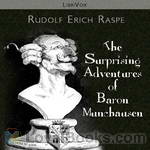 The Surprising Adventures of Baron Munchausen
The Surprising Adventures of Baron Munchausen
The stories about Münchhausen were first collected and published by an anonymous author in 1781. An English version was published in London in 1785, by Rudolf Erich Raspe, as Baron Munchhausen's Narrative of his Marvellous Travels and Campaigns in Russia, also called The Surprising Adventures of Baron Munchhausen. It is not clear how much of the story material derives from the Baron himself; however, it is known that the majority of the stories are based on folktales that have been in circulation for many centuries before Münchhausen's birth. | |
By: Rudyard Kipling (1868-1936) | |
|---|---|
 Letters of Travel
Letters of Travel
| |
By: Saki (1870-1916) | |
|---|---|
 Reginald
Reginald
Saki was the pen name of the British author Hector Hugh Munro (1870 – 1916). His witty, biting and occasionally odd short stories satirised Edwardian culture. Saki is considered a master of the short story and has been compared to O. Henry and Dorothy Parker as well as Noel Coward and Oscar Wilde (who clearly influenced Saki). His first collection of short stories, Reginald, was published by Methuen Press in 1904 though these stories first appeared in the ‘Westminster Gazette’. The stories... | |
 The Chronicles of Clovis
The Chronicles of Clovis
This is the third collection of short stories by Saki, following on from “Reginald” and “Reginald in Russia”. Although some of the stories have characters that do not appear elsewhere in the collection, many of them are loosely centred round the young Clovis Sangrail (effectively a reincarnation of Reginald). | |
 Beasts and Super-Beasts
Beasts and Super-Beasts
Saki (December 18, 1870 – November 14, 1916) was the pen name of British author Hector Hugh Munro. Saki’s world contrasts the effete conventions and hypocrisies of Edwardian England with the ruthless but straightforward life-and-death struggles of nature. Nature generally wins in the end. | |
 The Toys of Peace
The Toys of Peace
This is the fifth collection of short stories by Saki (H.H. Munro), and was published posthumously in 1923. Even so, many of the stories are quite up to the standard of those collected earlier. | |
By: Sara Ware Bassett (1872-1968) | |
|---|---|
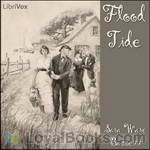 Flood Tide
Flood Tide
Willie Spence may have been a bit eccentric by most standards, but he had a knack for creating gadgets in his small workshop at his home on Cape Cod. Whenever he was 'ketched' by an 'idee' he had to see it to completion, and always did. His small cottage on the Cape had become a labyrinth of string and wires tacked here and there so as to make life a bit challenging for his housekeeper Celestina. But she and most everyone else among the coastal towns and villages loved the old man for all his eccentricities as Willie spent his waning years just waiting for his ship to come in. | |
By: Sewell Ford (1868-1946) | |
|---|---|
 Wilt Thou Torchy
Wilt Thou Torchy
| |
 Odd Numbers Being Further Chronicles of Shorty McCabe
Odd Numbers Being Further Chronicles of Shorty McCabe
| |
 On With Torchy
On With Torchy
| |
 Shorty McCabe on the Job
Shorty McCabe on the Job
| |
 The House of Torchy
The House of Torchy
| |